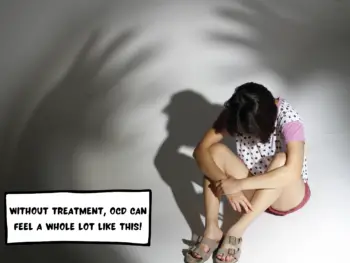
Updated: October 26, 2023 | Originally Posted: February 3, 2021
Your OCD shouldn’t stop you from traveling.
This mental health condition affects as many as 3 million adults in the United States, according to the IOCDF. That’s millions of potential travelers!
If you have OCD, you know how repetitive it feels. Your unwanted thoughts try to make you do compulsive behaviors to rid the thoughts, but it only makes your anxiety and uncertainty stronger.
It sucks that OCD is unwanted baggage you have to bring on your trip. You can’t leave your OCD at home. As daunting as travel may be, doing it with OCD presents extra challenges.
But it is very possible to travel with OCD. As a worldwide traveler with OCD, I have learned how to manage it while on the road. It takes proactive steps and smart planning. All of these tips take into account what life is like with OCD, which comes from my own experience with the disorder. When I take these steps, I can enjoy my travels while minimizing OCD’s distractions. And you can too!
Please consult professional help before using these tips. Here are some tips for managing traveling with OCD:
1. Seek professional help BEFORE traveling
Before you travel, get help from a therapist. A good one will use treatments that are commonly used for OCD. This may be cognitive behavioral therapy (CBT), exposure and response prevention (ERP), and/or acceptance and commitment therapy (ACT).
You should not travel if your OCD is left untreated. Otherwise, your OCD can give you extra anxiety on top of real travel worries. Your health is most important and should be taken care of.
Plus, you shouldn’t rely on local treatment. Many countries have a mental health stigma due to culture or lack of knowledge.
Before your trip, you could also inform your therapist where you’ll be traveling. Raise any concerns you have.
If you would like to, ask your therapist if you can set remote appointments while traveling.
To learn more about seeking mental health services before — and during! — your trip, here is a comprehensive guide with tips and resources.
2. Manage your medications
If you have prescribed medications for your OCD, make sure you bring enough doses to last the entire trip, plus a backup supply. Refilling your medication on the road may be difficult, depending on the medication itself and the destination you’re visiting.
Before your trip, research on the internet if your medication is illegal in the destination. For example, Google search, “Can I bring Xanax into Japan?” Look first for the country’s government website for medication rules and contact information if you still need your questions answered.
Most importantly, plan your medication with your doctor and pharmacist, who can help you get the supply you need and understand the medication regulations in your destination country.
Once you’re on the road with your medication, set up a reminder on your phone that will notify you when it’s time to take it. Make sure you are taking it at a consistent time. That way, you can develop a habitual, reliable routine.
Here is an in-depth guide on safely bringing mental health medications on your international trips.
3. Plan your trip, but don’t overdo it
It is so important, especially for travelers with OCD, to not go overboard with planning your trip. Not wanting to leave any uncertainties unanswered, I used to make meticulous plans. Once the trip began, I felt the pressure to stick with them. It took the fun out of the pre-trip planning and my travels.
But traveling will almost always force you to deviate from a detailed plan. Things sometimes don’t go the way you planned because guidebooks and travel blogs will never have all the answers that fit perfectly into a trip plan.
Don’t despair. Oftentimes, deviating from the plan brings even better moments that surprise you. Uncertainty doesn’t always have to be fearful. It can be beautiful! Sometimes, cool people or lovely views come my way when I accidentally get lost.
Yes, you should still plan logistics, some activities, and a packing list. But beware of overplanning.
4. Wear the Sunflower Lanyard at airports
This lanyard makes airport travel more accessible. When you wear the Hidden Disabilities Sunflower Lanyard at recognized airports, the staff will understand that you have a hidden disability. They should give you more time, patience, and help (if you ask for it). Your condition is kept confidential unless you want to mention it. Read my guide on how to get this free lanyard and where it’s recognized.
5. Travel to nearby destinations first
Travel doesn’t mean jet-setting throughout Europe or backpacking Asia for three months. Travel can be anywhere, however small or big the trip!
The first few times you travel, visit slightly unfamiliar places. You can travel within your own city, a neighboring state, or across your own country.
This will help you see how your OCD acts in new environments that aren’t too extremely different or overwhelming.
My first travels were within my home country, the United States. I practiced managing my OCD in new but familiar places in the US. This helped me learn how to manage my OCD while traveling in an easier setting. My later international travels were built on this foundation I built while in the US.
6. Notice how your OCD acts while traveling
Everybody’s OCD differs in severity, thought content, and frequency.
According to the mental health provider, Pulse TMS, some people experience more OCD symptoms when they have busy travel plans. For others (that’s me), it’s the slow plans.
During your travels, learn what makes your OCD more severe. Busy plans? Slow plans?
By learning how your OCD acts during a trip, you can travel with more awareness and readiness. It helps you set realistic expectations of your OCD while you travel. The fewer surprises, the better.
7. Forgive yourself for slip-ups
No matter how much mental fortitude you have, your OCD might still overwhelm you sometimes. After all, travel can be distracting. Despite the setbacks, allow yourself to accept that they happened, and try to do better next time. After all, being in a new environment might bring up new, unexpected stimuli. So, give yourself grace.
8. Know who to talk to for support
When you are overwhelmed and need to talk about your OCD to feel better, realize you are never alone, even while you’re traveling.
We blame the internet for everything. But it sure works well to connect with good friends and family at home. You could also consider talking it out with a new friend in your destination, if you feel safe with them and can trust them.
If your therapist allows remote appointments, call them up. You can also explore options for contacting a mental health professional while traveling.
9. Maintain a healthy sleep routine
Jet lag and time zone differences can disrupt your sleep routine. And if you’re not careful with your scheduling, you may cut down the hours you’re sleeping each night.
When you don’t have a consistent and healthy sleep schedule, your OCD could increase in frequency or severity, according to the Anxiety and Depression Association of America. When I’m sleepy, I experience more anxiety and OCD thoughts.
To practice a healthy sleep routine, try the following solutions:
- Don’t fill every empty gap in your schedule with activities and places. You’ll burn out, and worst of all, neglect time at the beginning and end of the day for sleep.
- Try slow travel, a form of travel in which you invest more time and effort into one or a few places. Hooray for more sleep!
- Plan a flight stopover to minimize jet leg. This will help your body acclimate to the changing time zones. Plus, you could visit another destination! I spent four fun days in Hawaii before flying to Australia. The Australians didn’t have to deal with another sleepy tourist.
- Consider travel destinations where you would fly north or south. That way, the jet lag is minor, if there’s any. For instance, if you are from the United States, fly to Canada or Latin America. Travel doesn’t have to mean going far.
10. Practice mindfulness
Take advantage of the new senses that travel offers. That new bread smell? That yummy taste of cake? The epic mountain scenery? Your feet wobbling over cobblestones? Take them all in.
Steer your conscious mind into the present moment. That way, your mind won’t wander around too much, and you can enjoy your travels to the fullest. By being mindful of the place you’re in, you’re taking attention away from your OCD.
Want to start incorporating mindfulness into your trips? Get your FREE guide!
***
In the beginning, traveling with OCD can be intimidating. But the advice I’ve shared will help you be proactive with your mental health so that you and your travel goals come first, not your OCD. Being prepared is key.
Think of the travel memories and friends you’ll make. They’ll always overshadow and shrink OCD’s grip on your life.
I’ve traveled near and far with my OCD. And you can too!
Sources:
- https://pulsetms.com/blog/5-tips-for-traveling-with-ocd/
- https://adaa.org/learn-from-us/from-the-experts/blog-posts/consumer/why-my-ocd-worse-vacation
Share this post on Pinterest, you savvy traveler.






 Does Mental Illness Make You Stronger? (I Have One)
Does Mental Illness Make You Stronger? (I Have One)